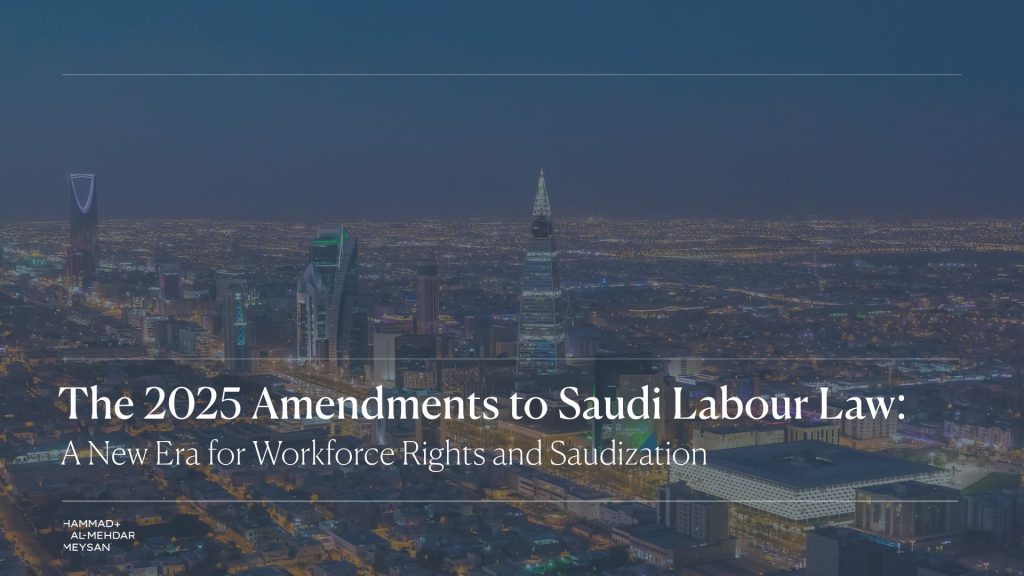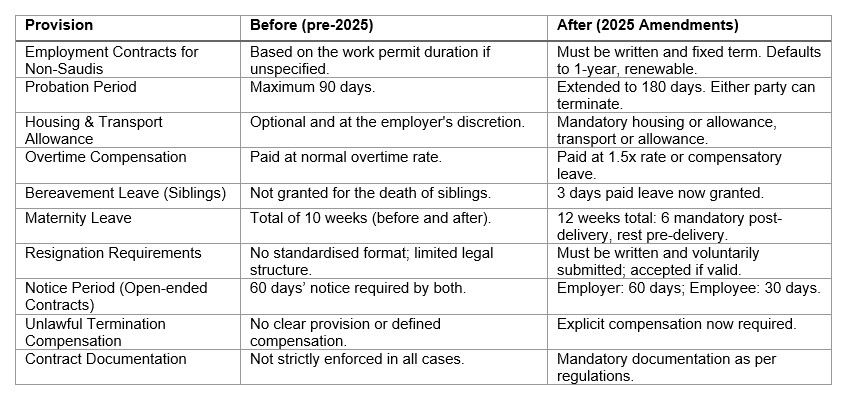
Saudi Arabia continues accelerating its labour market reform agenda by introducing comprehensive amendments to the Labour Law in 2025. The changes aim to balance employee protection with employer clarity while advancing the Kingdom’s Vision 2030 localisation strategy. These updates redefine key employment practices and signal a broader shift towards a more regulated, attractive, and future-ready labour market.
Strengthening Employment Clarity for Non-Saudi Workers
A significant highlight of the new law is the formalisation of employment contracts for non-Saudi nationals. All such contracts must now be written and fixed term. If a term is not explicitly stated, the law defaults to a one-year duration, renewable automatically. This offers much-needed transparency, minimising disputes and ensuring that employers and employees operate with mutual understanding and legal safeguards.
Extended Probation for Better Fit
The probation period has been increased from 90 to 180 days, granting both parties more time to evaluate fit, performance, and organisational alignment. This is a significant move for employers seeking assurance before committing to long-term hires, while employees gain more leeway to assess the role and workplace environment without penalty.
Mandated Housing and Transportation Benefits
Employers are now legally obliged to provide suitable housing, a housing allowance, and transportation or a transport allowance. Once optional or inconsistently applied, these provisions are now enshrined in law, enhancing workers’ welfare and aligning employment conditions more closely with international labour standards.
Enhanced Leave and Compensation Protections
Parental and compassionate leave provisions have also been upgraded. Maternity leave now totals 12 weeks—6 of which are mandatory after childbirth—an increase from the previous 10-week period. Importantly, employees are now entitled to 3 days of bereavement leave upon the death of a sibling, recognising the importance of familial bonds and emotional well-being.
Unlawful termination has also come under stricter scrutiny. Employers found to have unjustly dismissed employees will face clear and enforceable financial penalties. These rules are coupled with refined procedures for resignation, which must now be submitted in writing, free from coercion, and formally acknowledged by the employer.
Overtime, Notice Periods, and Fair Exit Terms
Employees required to work overtime must be compensated at 1.5 times their hourly wage or granted equivalent compensatory leave—whichever is mutually agreed upon. Notice periods have also been differentiated by party: employees must give 30 days’ notice when resigning, whereas employers must provide 60 days’ notice for termination, reflecting the power imbalance in employment relationships and offering greater protection to workers.
Boosting National Employment Through Saudization
Beyond employee protections, the amendments take deliberate steps to strengthen the localisation of jobs across strategic sectors. Updated Saudization (Tawteen) quotas now apply to a range of professions:
- Healthcare: 80% for clinical nutrition and physiotherapy, 70% for medical laboratories, and 65% for radiology roles.
- Accounting: Saudization will start at 40% in October 2025, with plans to escalate to 70% in later phases.
- Tourism and Hospitality: This includes hotel managers, receptionists, travel agency managers, and tour guides—areas that are expected to be major drivers of economic diversification.
- Engineering & Technical Jobs: 30% Saudization for companies employing five or more engineers or technicians. For detailed compliance rules, refer to the official Procedural Guide for Saudization of Technical Engineering Jobs.
- Pharmacy and Dentistry: Localisation targets gradually increase from 35% to 55%, depending on the phase and profession. For more, view the official announcement on the Saudization of Pharmacy Professions.
These policies align directly with Vision 2030’s national objectives: to create a resilient and inclusive labour market, reduce reliance on foreign talent in key sectors, and build a sustainable economy driven by Saudi talent.
Summary of changes:

A Strategic Turning Point
Collectively, these legislative updates represent more than just labour law reform—they symbolise Saudi Arabia’s commitment to fostering a fairer, more transparent, and opportunity-rich work environment for both local and expatriate communities. Employers must revisit their HR frameworks and compliance procedures, while employees gain from clearer entitlements and protections.
In the years ahead, the actual impact of these reforms will be measured by their implementation and enforcement. Yet, what is certain is that Saudi Arabia has taken a decisive step towards aligning its labour system with international standards while tailoring it to meet its unique national development goals.
